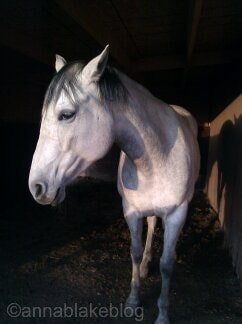 If you are standing next to your horse and he looks away, do you think he’s distracted or even disrespectful? When your horse yawns, is he sleepy or bored? If he moves slowly, is he lazy? These are important cues from your horse, are you hearing him correctly?
If you are standing next to your horse and he looks away, do you think he’s distracted or even disrespectful? When your horse yawns, is he sleepy or bored? If he moves slowly, is he lazy? These are important cues from your horse, are you hearing him correctly?
When it comes to communicating with horses, some humans are a bit like a self-obsessed rock star who throws a temper tantrum and trashes the room, but then assumes everyone wants his autograph. By equine standards, we ignore those around us and begin by screaming bloody-murder and escalate from there. Part of respecting a horse is remembering that their senses are much keener than ours. We can whisper.
It is just like man’s vanity and impertinence to call an animal dumb because it is dumb to his dull perceptions. ~Mark Twain.
Horses give us calming signals, just like dogs. Norwegian dog trainer and behaviorist Turid Rugaas wrote about it in 2005. She coined the phrase calming signals to describe the social skills, or body language, that dogs use to avoid conflict, invite play, and communicate a wide range of information to other dogs.
Calming signals in horses are somewhat similar and include looking away, having lateral ears, yawning, stretching down, licking lips or eating to calm themselves. Can you recognize them? Calming cues communicate stress, and at the same time, release stress. It is modeling behavior for us; they want us to drop our stress level, or aggressiveness as well.
When a horse looks away, either with his eyes or whole head and neck, it is a calming cue. He uses a signal like this when he feels pressured and wants the rider to know he senses the person’s agitation or aggression, but that person can calm down because he is no threat to the human. In the horse’s mind, he is communicating clearly and with respect.
Do you pull his head back and force his position? It’s human nature to turn up our volume if we think we aren’t being heard and maybe the hardest thing about listening to calming signals is that they kind of poke our dominant parts. So when the horse signals us to be less aggressive, but we mistakenly hear it as boredom or distraction or even disobedience, and then follow that up with a larger cue, we’re starting a fight. We’re letting the horse know we choose aggression over peace. Is that what you meant to say? Or is the appropriate positive response from a good leader to de-escalate the situation?
It is just like man’s vanity and impertinence to call an animal dumb because it is dumb to his dull perceptions. ~Mark Twain. (It deserves repeating.)
If riders want to understand the language of horses, we need stop seeing our horses in our own worst image (lazy or distracted) and begin a conversation where we listen more openly, more honestly. It’s much too simplistic to lump everything a horse does into either dominant or submissive behavior. Herd life has much more nuance than that. As social animals, they work to get along, encouraging others to cooperate. Even dominant boss mares give calming cues.
We can build trust with the horse if we learn to respect calming signals, and even reward them. In my training, the best calming signal I have is my breath. I can slow it down, emphasize the exhale, and just be still at the end. Using our breath is a huge aid that horses pay attention to, so much more than humans realize.
Each time I start work with a horse, I ask for his eye, using my eye. I want him to volunteer. If my horse looks away, I take a deep breath, acknowledge the moment, and go slow. Usually on my second or third breath, he’ll look back and tell me he’s ready. It’s a short wait, compared to putting fear or resistance in that eye.
Reading horse body language takes some quiet time to learn, and they aren’t all exactly alike. Some horses are so shut down, so overwhelmed by us pounding on them in the past, that they have no calming cues at all, but you can remind him. Calming is a good thing, no matter who cues it.
If you are thinking of tuning up your communication skills with your horse, I really recommend ground work. It’s my favorite thing about the Horse Agility we do here at Infinity Farm in the summer. Obstacles are great conversation starters with a horse, and if the human can get past needing to dominate the obstacle, communication can be eloquent, with understanding and a healthy give-and-take reasoning. And it all translates to the saddle later.
Now that I think about it, when I meet someone who is loud or aggressive, I tend to look away, too. Sometimes I turn my shoulders sideways and don’t make eye contact. I notice I don’t like aggressive people crowding me and talking loud either. This is about the time I become aware that I do groundwork with humans as often as I do horses. Maybe the real reason we shouldn’t humanize horses is because they had it right in the first place.
Anna Blake, Infinity Farm.
You need to be a member of Barnmice Equestrian Social Community to add comments!
Join Barnmice Equestrian Social Community